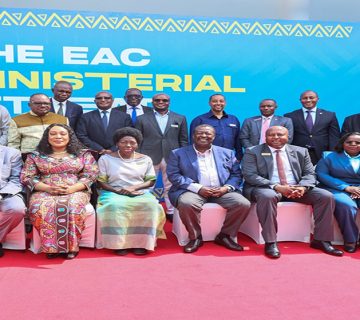On February 5, 2019, the United States sent out an alert to its citizens in Kenya to be vigilant as they maybe a target to the extremist group al Shabab. The Intel comes weeks after the Dusit attack were 21 people were killed including an American and British citizen. The embassy warned its citizens to be careful when in public spaces like malls, hotel and places of worship. Al Shabab is known for attacking spaces frequented by foreigners, Westgate Mall being an example. The aim of the group is to cause fear, and Kenya has become a target ever since the Kenya Defence Forces were sent to Somalia 2011 to deal with the threat of the extremist group whose wish is to topple the Somalia government and rule under sharia law. While the group exists, it shall be a problem for Kenya which in turn will have an adverse effect on the security situation of the region.
President Uhuru Kenyatta welcomed newly-elected President Felix Tshisekedi of the Democratic Republic of Congo in Nairobi, Kenya and held talks on strengthening bilateral relations between the two nations. Kenyatta spoke on aiding in finding a solution to the instability of the DRC and applauded Congolese for the manner in which the country held its elections. Tshisekedi thanked Kenyatta for his support, cherished the friendship that has been established, and spoke on the port of Mombasa being beneficial to the country economically. Kenya offered to train Congolese civil servants, a gesture that is believed to help in its development goals.
Human rights activist, Caroline Mwatha, who’s missing case had first caused a stir in social media with hashtags like #FindCarolineMwatha has been found dead. Mwatha was known for her work in documenting extrajudicial killings and other forms of police brutality in Dandora, Nairobi. Police reported that Mwatha may have died from complications while undergoing an abortion but close friends and family disagree with the police report and think she was a target of the police due to her line of work. Activists have called for an independent investigation of the death of Mwatha and have called on authorities to provide protection to activists like Ms. Mwatha as they are exposed to multiple dangers in their field of work.
Kenya sent back the Somali ambassador, Mohamed Muhamed Nur, to his home country for consultation in regards to the oil blocks that were allegedly auctioned off in disputed maritime territory between the two countries. The expulsion of the Somali ambassador and the recalling of the Kenyan ambassador, Lucas Tumbo, has deepened the rift between the two countries. Somalia denies selling the alleged oil and gas exploration blocks at a London auction on February 7, 2019 and commits to waiting on the verdict of the International Court of Justice (ICJ). In 2014, Somalia took the case to the ICJ, Kenya filed for a preliminary objection and lost; now the case shall go ahead for a full hearing. The Cabinet Secretary of foreign affairs, Monica Juma, claimed that Kenya shall not lose an inch of her territory and set a few conditions in resolving the matter, the top priority is finding a peaceful resolution to the maritime dispute.
The three-week nurses’ countrywide strike has been called off, that began on February 4th was sparked by the government failing to meet their pay demands. The government claimed not to have the money to raise salaries and if they cede to the demands of the nurses the assumption is other health workers will demand for pay raise and it shall have a ripple effect to the system. The strike was on in several counties including Kisumu, Wajir, Samburu, and Nyeri. However, on February 26, 2019, the strike was called off by Kenya National Union of Nurses.
The ruling on whether to remove or uphold colonial-era law that prohibits gay sex has been deferred to a much later date of May 24 this year. The decision by Kenya’s High Court (citing the need for more time to prepare for the case) has disappointed gay rights groups and the LGBTQ community. Activists believe this case could give Kenya a chance to set a trend in Africa to fight for gay rights. In most countries on the continent, being gay is a taboo or sometimes even a crime, and harassment is common. Several countries have decriminalised same-sex relationships in the recent years including Angola and India, and most campaigners believe that it is the first step in protecting same-sex relationships, thus the Kenyan government’s priority should be to protect the life of every individual despite their sexual orientation and stop the discrimination against the LGBTQ community.

